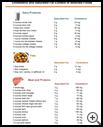
Taking Care of Your Cholesterol: Brief Version
________________________________________________________________________
KEY POINTS
- Your body makes some cholesterol, and you get the rest from foods such as meats, dairy products, and eggs.
- Eating a diet high in fiber and low in saturated fat and cholesterol, losing weight, and exercising can help lower your cholesterol levels.
- Follow your healthcare provider’s advice about exercise.
________________________________________________________________________
What is cholesterol?
Cholesterol is a type of fat. It has both good and bad effects on the body. On the good side, it helps build the hormones and cells your body needs. But when you have too much cholesterol, it sticks to the inside of the blood vessel walls. This can cause heart disease, heart attack, and stroke.
What should I do if my cholesterol is too high?
Here are some things you can do to lower your cholesterol:
- Eat healthy foods.
- Lose weight if you are overweight.
- Exercise.
- Don’t smoke.
It's important to eat healthy foods.
- Use healthy oils like olive oil and canola oil. Stay away from unhealthy oils like palm kernel oil and coconut oil and solid shortening.
- Eat less saturated fat, like the fat in butter and red meat. Eat fish and chicken and turkey without the skin instead of a lot of red or processed meat.
- Drink nonfat or 1% milk instead of whole milk. Also eat yogurt, cottage cheese, or sour cream that is low-fat or nonfat instead of regular fat.
- Eat more fresh fruit and vegetables, beans, and oatmeal, and other whole grains.
- Eat 4 to 5 small servings (about 1/4 cup) of nuts a week (almonds, walnuts, low-salt peanuts).
- Eat less fried food and junk food, like french fries, chips, cookies, crackers, and doughnuts.
- Eat less sugar and sugary drinks, like soda.
If you are overweight, you can lose weight by eating fewer calories and getting more exercise.
- You may want to swim, jog, walk, or bicycle.
- You should exercise at least 30 minutes most days of the week.
If you haven't been exercising, ask your provider to give you a physical activity plan that tells you what kind of activity, and how much, is safe for you. Start slowly to avoid injury.
Sometimes your healthcare provider may prescribe medicine as well as healthy eating and exercise to help you lower your cholesterol.

